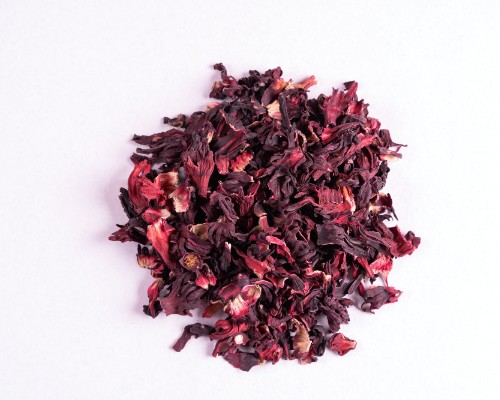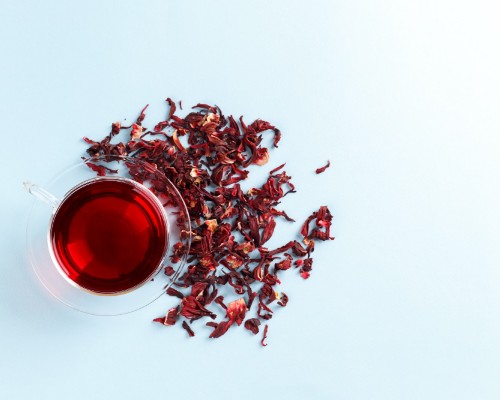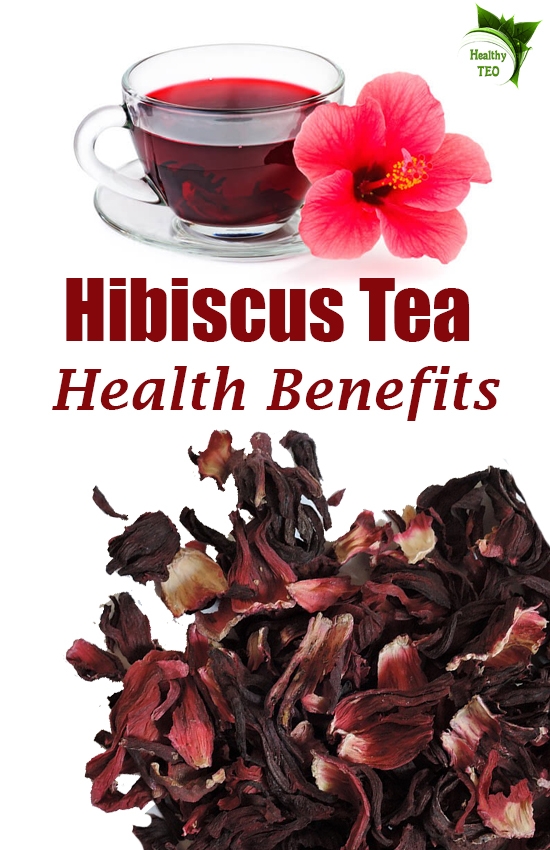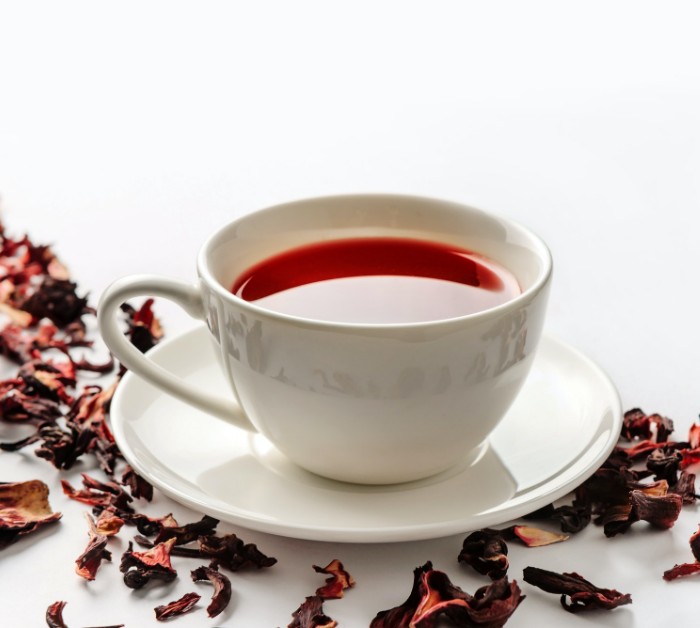Benefits of consuming hibiscus tea and side effects that you should know
Any kind of tea is good for your health. But here we will put a special accent on hibiscus tea and its health benefits.
Hibiscus tea, also known as Agua de Jamaica, and by its scientific name Hibiscus sabdariffa is prepared by boiling parts of the hibiscus plant.
Hibiscus tea is ruby red or deep magenta and has a sour taste. It is a caffeine-free drink with a sweet yet tart flavor making it the perfect swap for a sugary-filled juice or beverage.
Its red or deep magenta color comes from anthocyanins (a type of flavonoid, a class of compounds with antioxidant effects). Hibiscus tea can be served cold on summer days as ice tea or hot to warm you on cold winter days.
Read further to discover the benefits and side effects of hibiscus tea and how to prepare this healthy beverage at home.
This post may contain affiliate links, which means we may receive a small commission, at no cost to you, if you make a purchase through a link. For more information, please see our disclosure

Health Benefits of Hibiscus Tea
Manages Blood Pressure
A report from the AHA (American Heart Association), published in November 2008, suggests that consuming this tea lowers blood pressure in pre-hypertensive and mildly hypertensive adults. It also states that 1/3 of adults in the United States suffer from high blood pressure, also referred to as hypertension.
A study published in the Journal of Ethnopharmacology suggests that hibiscus has antihypertensive and cardioprotective properties, which can be beneficial for people suffering from hypertension and those at high risks of cardiovascular diseases.
Because of its anti-inflammatory properties, hibiscus tea can reduce blood pressure by up to 10 points, according to research done at Tufts University in Boston. For this drastic improvement to occur, you need to regularly consume three cups of this tea every day for a few weeks. Also, it has diuretic properties that increase urination and simultaneously lower blood pressure.
Important: If you have problems with blood pressure be sure to consult with your doctor before start consuming hibiscus tea.
Georgia Rounder, registered dietitian nutritionist says that this tea can also cause systolic blood pressure levels to drop to unsafe levels, which can be troublesome if taking medications for hypertension or low blood pressure.
Weight Loss
Hibiscus herbal tea can be beneficial for weight loss. Studies have suggested that hibiscus extract lowers the absorption of starch and glucose the two dietary components that can lead to weight gain and may help aid in weight loss.
It is important to know that this study used hibiscus extract, which is more concentrated than tea. One serving of the extract equals six servings of tea. You may see similar results of drinking the tea, but they will be on a smaller scale.
Hibiscus inhibits the production of amylase, which helps in the absorption of carbohydrates and starch, so drinking it lessens the absorption from occurring. Therefore, hibiscus can be found in many weight loss products.
The antioxidants in the tea are helpful in reducing oxidative stress in the body. Oxidative stress occurs when free radicals attack the body and the body does not have enough antioxidants to combat them. Free radicals can make huge damage to humans health from cancer to aging skin.
Hibiscus tea contains ORAC values (lab test that quantifies the antioxidant capacity of food) twice as high as matcha tea. Previously was thought that matcha is the most potent tea with antioxidants.
Lowers Cholesterol
Another health benefit of drinking hibiscus tea: Helps you to keep cholesterol levels in check. By doing that your heart and blood vessels stay healthy.
In a study published in The Journal of Alternative and Complementary Medicine in august 2009, researchers investigated the hypolipidemic effects of sour tea (Hibiscus sabdariffa) in patients with diabetes and compare them with those of black tea.
The results from the study showed that drinking this tea two times daily for one month reduced cholesterol levels among diabetes patients. Including the “bad” cholesterol – LDL and triglycerides levels while boosting levels of the “good” cholesterol HDL.
Anti-Inflammatory and Antibacterial Agent
The hibiscus plant’s loose leaf tea is rich in ascorbic acid, also known as vitamin C. It is an essential nutrient required by your body to boost and stimulate the activity of the immune system.
It can help protect you from catching a cold and flu. It may also be used to treat discomfort caused by fever, due to its cooling effect.
Consuming hibiscus tea could be helpful for patients who suffer from anemia because this tea is rich in iron. One cup serving delivers 20 milligrams of iron. Iron is an important mineral that keeps the immune system balanced and helps the body to maintain the red blood cells. Not just iron it is also rich in potassium, magnesium, and zinc.
Rich with phytochemicals like anthocyanin and polyphenols, hibiscus tea can help lower the inflammation in our bodies. It is an important benefit of consuming this tea because inflammation can increase your risk of developing diabetes, arthritis, or cardiovascular disease.
Improves Digestion
Many people drink hibiscus tea to improve digestion as it regularizes both urination and bowel movements. This herbal tea has a natural diuretic function helping to remove both water and sodium from the body, contributing to normal urination, bowel movements.
Be aware: Adults should not exceed over two quarts ( 1 quart = 946 milliliters ) a day of hibiscus tea, and children no more than one quart a day.
Pregnant women should not drink more than one liter a day. The reason for this is that this tea contains aluminum and manganese. Manganese can cause side effects like shakiness, and super-high levels of aluminum are associated with Alzheimer’s.
But don’t worry about this. If you don’t drink hibiscus tea every hour of the day you will be fine. Everything must be consumed in moderation, that is the key to a healthy life.
Kidney Stone Prevention
Kidney stones are formed when there is a build-up of calcium oxalates in the urine. These stones are painful and it is hard to eliminate them from the body.
In a study published in June 2012 where was evaluated Hibiscus sabdariffa L. extract as a way to prevent calcium oxalate crystals from turning into stones, was found that calyces of the hibiscus flower are anti-urolithiasis and can be consumed with no harmful effects. As a conclusion from this study comes that drinking hibiscus tea can prevent in forming kidney stones.
Possible Side Effects Of Drinking Hibiscus Tea
Although this tea has many health benefits it is known to have some side effects too. A high dosage of this tea can cause liver damage.
Also, pregnant women should not consume it because hibiscus can affect estrogen levels which means that it has effects on pregnancy and fertility too.
People with high blood pressure and high blood sugar levels if consuming this tea should regularly check their sugar and blood pressure levels as it may decrease sugar and pressure levels. It can cause blood sugar to drop suddenly and even cause nausea and ear-ringing.
If you are on any birth control pills or on any kind of hormonal treatment it is recommended to avoid taking this tea.

How To Prepare Hibiscus Tea
It is very easy to make hibiscus tea; all you need is a pan, water, hibiscus flowers, and sugar or honey. Let us take a look at the step-by-step process of making hibiscus tea at home.
Our suggestion: If you don’t like to use classic teabags or to chop hibiscus flowers, click here to try this Shatavari and Hibiscus blend (designed to support every woman by restoring balance in the mind, body, and soul). All ingredients are organic and it is ready for 5-7 minutes.
Note: If you use fresh hibiscus flowers remove the calyx (the green part from which the flowers are attached to the plant). Also remove the stamen, the part from which the seeds are attached. Wash the petals well and add them to a pot.
Ingredients
- 2 tsp dried hibiscus flowers
- boiling water
- cinnamon stick optional
- clove optional
- teabag optional
- lime wedges optional
- ginger optional
- mint leaves optional
Instructions
On the stove, keep a pot of water to boil. Meanwhile, keep all the ingredients ready for the recipe, if you haven’t.
Take 2 tsp of dried hibiscus flowers, which equals 10 ml of the same (to be more accurate), and add it to the boiling water.
You are free to add more or less of the hibiscus flowers, depending on how strong you want your tea to be. It’s important to note here that hibiscus tea doesn’t have caffeine, so adding a lot of it won’t harm your health.
Once the water is boiled, pour the water slowly and steadily into a teapot. Make sure you have worn mittens/gloves to protect your hands from any kind of burns.
If you want to add caffeine to your tea, add a teabag to the concoction. Allow it to steep for five minutes.
While you wait, the hibiscus flowers will give the water a somewhat sharp, zingy taste. If you wish your tea to be strong, allow it to steep for more than 5 minutes.
Once done, pour the tea into your cup, using a metal strainer. If your teapot has an in-built filter, the process will be way easier.
Some people like to chew the hibiscus petals and don’t prefer to strain them. You can try that as well if you like. Don’t forget to add your preferred sweetener to the beverage. Try it with honey if you can, as it goes very well with the zestfully tart flavor of the tea. You can add sugar or stevia as well, depending on your choice.
How much to drink: There isn’t enough research done on this, but it is recommended to limit your consumption to 2-3 cups a day.
How much hibiscus tea can I drink daily?
There isn’t enough research done on this, but it is recommended to limit your consumption to 2-3 cups a day.
Bonus Tip: If you want to learn how to plant hibiscus and care for hibiscus plants, visit this article How To Care for Hibiscus Plants.

Final thoughts about the benefits and side effects of consuming hibiscus tea:
Consuming hibiscus tea is very beneficial for your health. Especially it helps with hydration and by consuming it you will increase the number of antioxidants needed for proper body function.
But be careful and don’t over-drink it due to its side effects. Enjoy!
Related with herbal teas benefits:
- Elderberry Tea: Benefits, Dosage, and Side Effects
- Rooibos Tea | Wonderful Benefits And Potential Side Effects
- Benefits of Bay Leaf Tea and Its Side Effects
- Best Herbal Teas That Are Alternative To Morning Coffee
Hibiscus Tea: Health Benefits and Side Effects
References: academic.oup.com ncbi.nlm.nih.gov organicfacts.net




